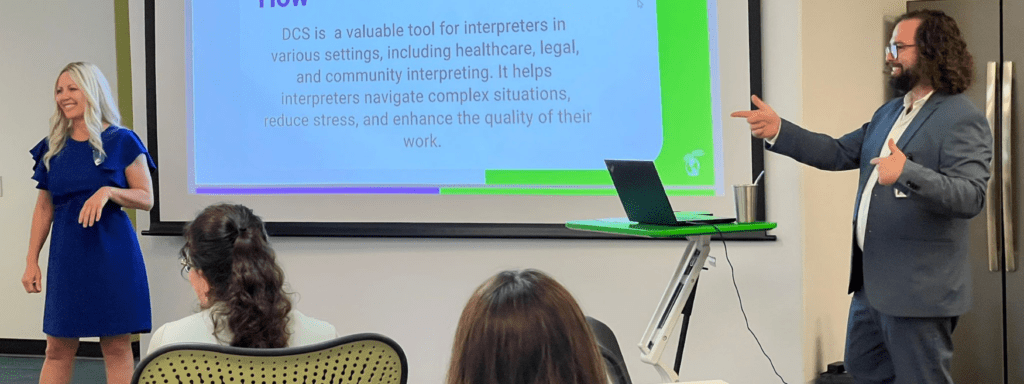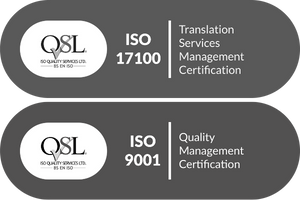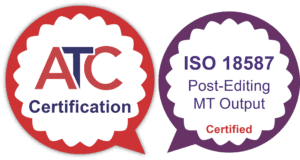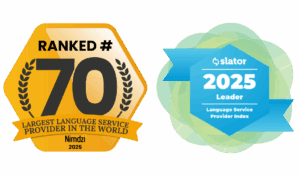
Back in 2006, I was first introduced to the Demand Control Schema (DCS) as a framework to analyze my work as a sign language interpreter. It offered a new lens through which I could evaluate my real-time decisions during interpreting assignments and assess the impact of those choices. I distinctly remember the “aha” moment when DCS allowed me to truly grasp the often elusive response, “It depends on the situation,” in determining what actions to take—or in retrospect, what actions I should have taken.
Originally developed for American Sign Language (ASL) interpreters, the Linguava training team is now offering DCS to spoken language interpreters, particularly in the medical field, where thoughtful, situation-specific decisions are crucial. In July and August, Daniel Halberg, Linguava’s Senior Interpreter Training Manager, Valeria McNuty, Interpreter Trainer, and I held our first DCS training sessions for spoken language interpreters. One interpreter remarked after the initial session:
“I learned better ways to be an interpreter in terms of recognizing how to better prepare myself for next appointments, how to identify the amount of control I have in an appointment in order to realize how to create a more successful appointment to create a more satisfactory experience with my services interpreting, and how to better reflect on my job in order to improve.”
Medical interpreters play a pivotal role in healthcare settings, acting as essential links between healthcare providers and patients who speak different languages. As a practicing profession within the medical field, interpreters face complex and dynamic challenges that require more than just language proficiency—they must navigate cultural nuances, ethical dilemmas, and the emotional weight of sensitive medical interactions. Traditionally, the interpreting profession has relied on general skills and personal experience to manage these complexities. However, spoken-language interpreters have often lacked structured tools to analyze their work, refine their decision-making processes, and enhance their skillsets systematically.
Understanding Demand Control Schema: From ASL to Spoken Language Interpreting
The Demand Control Schema was created by Robyn Dean and Robert Pollard as a way to systematically address the demands placed on ASL interpreters and the controls they can use to manage these demands. The framework categorizes the various challenges (demands) that interpreters face during assignments and the strategies (controls) they can employ to handle these challenges effectively.
- Demands: These are factors that affect the interpreting process, such as the setting (e.g., a medical consultation), the complexity of the language, the emotional tone of the interaction, and the cultural context.
- Controls: These are the strategies or techniques that interpreters can use to manage these demands, ensuring clear, accurate, and culturally appropriate communication.

Interpreting as a Practice Profession: A Paradigm Shift
One of the key concepts introduced by the Demand Control Schema is the idea of interpreting as a “practice profession.” This concept likens interpreting to other professions such as medicine or law, where professionals must navigate complex, real-time decision-making processes that require both technical skills and ethical judgment.
- Comparison to Physicians: Like physicians, medical interpreters must make decisions that have significant consequences for the well-being of their clients. Physicians rely on their medical knowledge and ethical guidelines to make informed decisions about patient care. Similarly, interpreters must use their linguistic skills and ethical frameworks to make decisions that ensure accurate and effective communication, often under pressure and in real-time.
- Complex Decision-Making: Just as a physician might need to decide on the best course of treatment based on a range of medical factors, a medical interpreter must decide on the best way to convey complex medical information to a patient, considering linguistic, cultural, and emotional factors. This decision-making process is central to the concept of interpreting as a practice profession, where interpreters are not just passive conduits of information but active participants in the communication process.

Benefits of Demand Control Schema for Medical Interpreters
- Enhanced Professionalism – By framing interpreting as a practice profession, DCS elevates the role of medical interpreters to one that is comparable to other healthcare professionals. This recognition encourages interpreters to approach their work with the same level of professionalism and commitment to ongoing education and ethical practice that is expected of doctors, nurses, and other healthcare providers.
- Structured Decision-Making – DCS provides medical interpreters with a framework for making informed decisions during their assignments. This is especially important in healthcare settings, where the stakes are high, and the accuracy of interpretation can directly impact patient outcomes. By systematically evaluating the demands of each situation and applying appropriate controls, interpreters can ensure that they are providing the best possible service to both patients and healthcare providers.
- Stress Management – The complexity and emotional intensity of medical interpreting can be overwhelming. DCS helps interpreters manage this stress by providing a clear structure for understanding and responding to the demands of their work. By breaking down these demands and identifying effective controls, interpreters can reduce their cognitive load and avoid burnout, leading to better job performance and personal well-being.
- Ethical Decision-Making – Medical interpreters often face ethical dilemmas, such as balancing the need for accuracy with patient confidentiality or deciding how to handle culturally sensitive information. DCS offers a framework for navigating these challenges, helping interpreters make decisions that uphold the highest ethical standards while ensuring effective communication.
- Improved Patient Outcomes – The ultimate goal of medical interpreting is to facilitate clear and accurate communication between healthcare providers and patients. By using DCS to manage the demands of their work, interpreters can ensure that patients fully understand their diagnoses, treatment options, and medical instructions. This not only improves patient satisfaction but can also lead to better health outcomes, as patients are more likely to follow treatment plans when they fully understand their healthcare providers.
The introduction of Demand Control Schema to the field of medical interpreting represents a significant advancement in how spoken language interpreters approach their work. By adopting this framework, medical interpreters can enhance their professionalism, make more informed decisions, and ultimately improve the quality of care for patients who rely on their services. As the concept of interpreting as a practice profession continues to gain traction, frameworks like DCS will become increasingly important in supporting interpreters to meet the growing demands of their field.

Krystill Brown is the Vice President of Sales and Marketing with Linguava Interpreters, Inc. She transitioned from a career focused on ASL services to Linguava in 2021 and has led their sales growth to a record 284%. She started her career in the language services industry 26 years ago as an American Sign Language Interpreter, holding her RID, NAD, and EIPA certifications.
Since 2008, she has led operations, marketing strategies, and business development teams to success. Krystill is best known for driving sustainable revenue growth and fostering meaningful client relationships focused on the value of quality access. Growing up in an ASL/English bilingual home has provided her a deep understanding of the importance of quality services that fuels her dedication to inclusion through equal access to communication. She lives in San Diego, CA with her 2 sons, and her biggest personal accomplishment this year has been earning her blue belt in Brazilian Jujitsu.
Works Cited
- Dean, Robyn, and Robert Pollard. Application of Demand-Control Theory to Sign Language Interpreting: Implications for Stress and Interpreter Training. Journal of Deaf Studies and Deaf Education, 2001.
- Dean, Robyn, and Robert Pollard. The Demand Control Schema: Interpreting as a Practice Profession. CreateSpace Independent Publishing Platform, 2013.
- Winston, Elizabeth A., and Robert G. Lee. Mentorship in Sign Language Interpreting. Gallaudet University Press, 2013.
- Leanza, Yvan, et al. Medical Interpreting: Improving Communication with Multicultural Patients. Journal of Clinical Outcomes Management, 2010.
The Future of Interpretation is Here
For more information about the program and to secure your spot in our upcoming classes, please visit the Linguava Interpreter Academy. Join us on our journey to transform healthcare language access and empower individuals worldwide.
At Linguava, we are here to support you as your partner in language access. We are also ISO 9001, 18587, and 17100 certified, ensuring quality translations. As a leading provider of language services for the healthcare industry, we offer a wide range of services to help medical practices incorporate language access successfully. These include Translation and Localization , Scheduled Video Interpretation, Video Remote Interpretation, Over the Phone Interpretation, and American Sign Language Interpretation.
If you have a file ready to translate, get your file analysis and free quote here.









